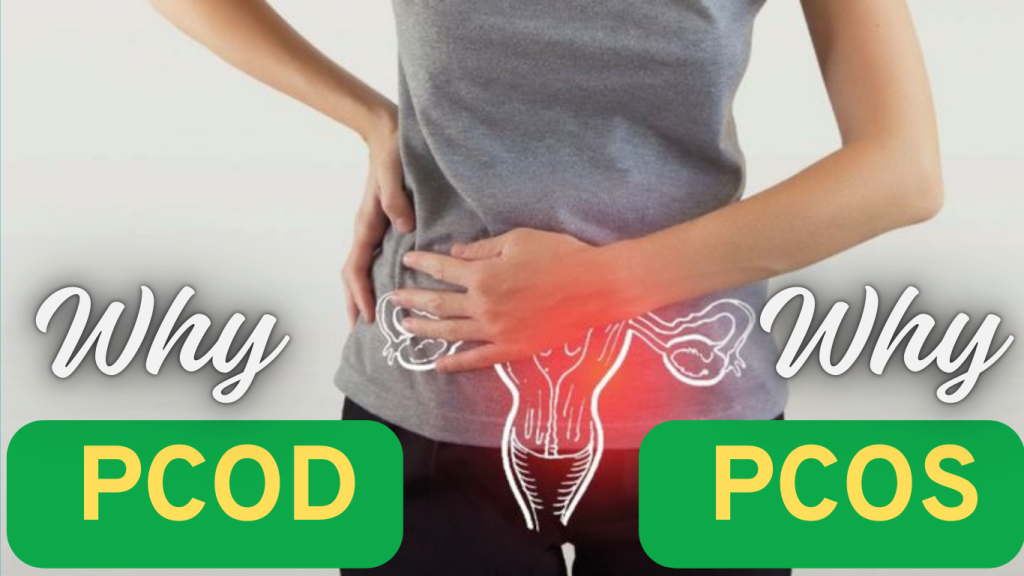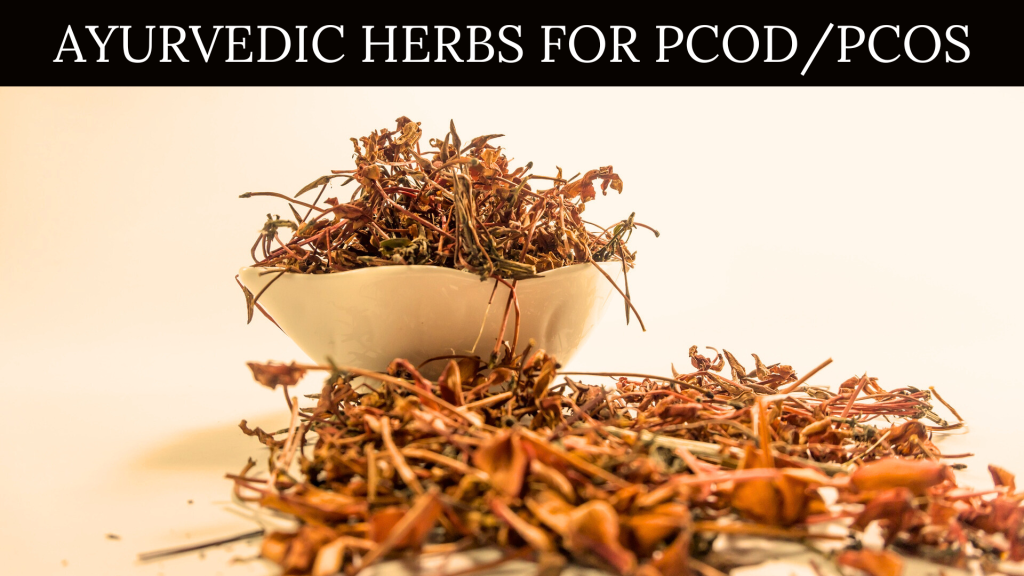If you’re struggling with irregular periods, acne, or unexplained weight gain, you might be wondering if PCOD/PCOS is the culprit. As a health blogger passionate about Ayurveda, I’m here to break down these confusing terms in plain English. No jargon, no scare tactics—just real talk about your health.
In today’s time, the problem of PCOD/PCOS has become common in women. Today, 3 out of 10 women are suffering from PCOD/PCOS.
If you want to get rid of this problem, then today we should ask why this happens, what are its symptoms and how can it be treated. This is a problem. To get rid of this, we should pay attention to many things. Let’s know what is PCOD/PCOS.

Polycystic Ovary Disorder (PCOD) and Polycystic Ovary Syndrome (PCOS) are two common hormonal disorders affecting millions of women globally.
Although both conditions sound similar, they have some key differences. Understanding what is PCOD / PCOS & difference between PCOD/PCOS is important for women’s health, especially when looking for natural or Ayurvedic solutions.
In this article, you will learn what PCOD/PCOS are, their causes, symptoms, differences, types, Ayurvedic treatments, home remedies, uses of herbs, and lifestyle tips to manage these conditions naturally.
What Exactly is PCOD?
PCOD is a condition where your ovaries produce immature or partially mature eggs. These eggs may turn into cysts (fluid-filled sacs), causing hormonal chaos. This affects hormonal balance and can lead to irregular periods, weight gain, and fertility problems.
Causes of PCOD
⏺ Excess insulin production
⏺ Hormonal imbalance
⏺ Poor diet and sedentary lifestyle
⏺ Environmental toxins
⏺ Stress and anxiety
Symptoms of PCOD
⏺ Weight gain, especially around the waist
⏺ Acne and oily skin
⏺ Hair thinning or hair loss
⏺ Infertility or difficulty conceiving
⏺ Irregular or delayed periods
What is PCOS?
Polycystic Ovary Syndrome (PCOS) is a more severe metabolic condition where hormonal imbalance leads to enlarged ovaries with multiple small cysts. PCOS often affects the entire endocrine system and can have long-term health risks like diabetes and heart disease.
PCOS is a more serious condition and is associated with a higher risk of infertility, obesity, and diabetes. It is a major metabolic disorder that can lead to infertility and metabolic problems.
PCOS is a metabolic syndrome (not just an ovarian issue!). It’s a full body hormonal rebellion where your ovaries, adrenal glands, and fat tissue overproduce androgens (male hormones). This disrupts ovulation, periods, and overall health.
Causes of PCOS
⏺ Chronic inflammation
⏺ High levels of androgens (Male Hormones)
⏺ Insulin resistance
⏺ Genetic predisposition
Symptoms of PCOS
⏺ Facial hair growth
⏺ Heavy bleeding during periods
⏺ Male-pattern baldness
⏺ Obesity
⏺ Mood swings and depression
⏺ Irregular or no menstrual cycles
Difference Between PCOD and PCOS
Here’s a comparison table to clearly understand what is PCOD / PCOS & difference between PCOD / PCOS
| Nature | Hormonal imbalance | Metabolic disorder |
| Severity | Less severe | More severe |
| Fertility | Often fertile with minor difficulties | May face serious fertility issues |
| Periods | Irregular, but still occur | Very irregular or absent |
| Cysts in ovaries | Immature eggs develop into cysts | Hormonal imbalance leads to cyst formation |
| Long-term effects | Manageable with lifestyle changes | Risk of diabetes, heart disease, infertility |
| Occurrence | More common | Less common |
| Reversibility | Easier to manage | Requires medical and lifestyle intervention |
Why Confusion Happens
Both cause similar symptoms like irregular periods, acne, and excess hair growth. But PCOS is a systemic disorder with long-term risks, while PCOD is primarily ovarian.
Types of PCOD / PCOS
Understanding the types can help choose the right treatment method, including Ayurvedic remedies.
PCOD:-
⏺ Inflammatory PCOD – Caused by chronic inflammation.
⏺ Post-Pill PCOD – Occurs after stopping birth control pills.
⏺ Insulin-Resistant PCOD – Linked to obesity and sugar imbalance.
PCOS:-
⏺ Hidden PCOS – Caused by hidden health issues like thyroid imbalance.
⏺ Adrenal PCOS – Due to excess stress hormone production.
⏺ Inflammatory PCOS – Low-grade inflammation in the body.
⏺ Insulin-Resistant PCOS – High insulin levels affecting ovary function.

Natural Management Ayurveda’s Holistic Approach
In Ayurveda, PCOD / PCOS are often seen as disorders of Kapha dosha and Vata imbalance, affecting the reproductive system. Ayurvedic treatment focuses on detoxification (Panchakarma), balancing hormones, and improving metabolism naturally.
| Herb | Uses and Benefits |
|---|---|
| Shatavari | Regulates hormones, improves fertility |
| Ashoka | Reduces menstrual pain and balances estrogen levels |
| Lodhra | Controls excessive bleeding and hormonal imbalance |
| Triphala | Detoxifies the body and improves digestion |
| Turmeric | Reduces inflammation and supports liver health |
| Guduchi | Enhances immunity and reduces insulin resistance |
1. Panchakarma Therapy :-
Vamana (emesis), Virechana (purgation), Basti (medicated enema), Nasya (nasal drops)
These therapies help detoxify the body and reset hormonal balance.
2. Herbal Remedies :-
✅ Shatavari powder- with warm milk helps regulate menstrual cycles.
✅ Triphala churna – taken at night improves digestion and hormonal health.
3. Yoga and Meditation :-
Yoga improves blood circulation to the pelvic region and helps in stress management.
Asanas :- Supta Baddha Konasana, Bhujangasana, Dhanurasana
Pranayama :- Anulom-Vilom, Bhramari
Natural Home Remedies for PCOD / PCOS
Aloe Vera Juice :- Helps in detoxification and hormonal balance. Consume on an empty stomach.
Fenugreek Seeds :- Soak overnight and consume in the morning to support insulin regulation.
Cinnamon :- Helps regulate insulin levels. Add ½ teaspoon to your daily tea or smoothie.
Apple Cider Vinegar :- Controls blood sugar levels and aids weight loss. Mix 1 tbsp in warm water and drink before meals.
Diet Tips for Managing PCOD / PCOS
Foods to Eat
✔ Lean protein like lentils, chickpeas
✔ Fresh fruits and vegetables
✔ Nuts and seeds (flaxseeds, sunflower seeds)
✔ Herbal teas (spearmint, ginger, tulsi)
✔ Whole grains like oats, quinoa, brown rice
Foods to Avoid
❌ Fried and junk food
❌ Dairy products in excess
❌ Processed snacks and meats
❌ Caffeine and alcohol
❌ Refined sugar and flour
Lifestyle Tips for PCOD / PCOS
⏺ Maintain a regular sleep cycle
⏺Track your menstrual cycles
⏺ Maintain a healthy body weight
⏺ Avoid stress and anxiety
⏺ Exercise daily (walk, yoga, dance)
⏺ Stay hydrated (at least 2–3 liters daily)
(FAQs)
PCOD is a hormonal imbalance, while PCOS is a more serious metabolic disorder with broader health implications.
With the right diet, lifestyle, and Ayurvedic remedies, symptoms can be controlled and managed effectively.
Yes, PCOS may lead to diabetes, heart disease, and infertility if not treated properly.
Yes, Ayurveda offers natural treatments including herbs, Panchakarma, yoga, and dietary changes.
A low-sugar, high-fiber, plant-based diet with natural herbs and regular meals helps manage both conditions.
Yes! Ovulation-inducing herbs like Dashmool and fertility yoga boost success rates.